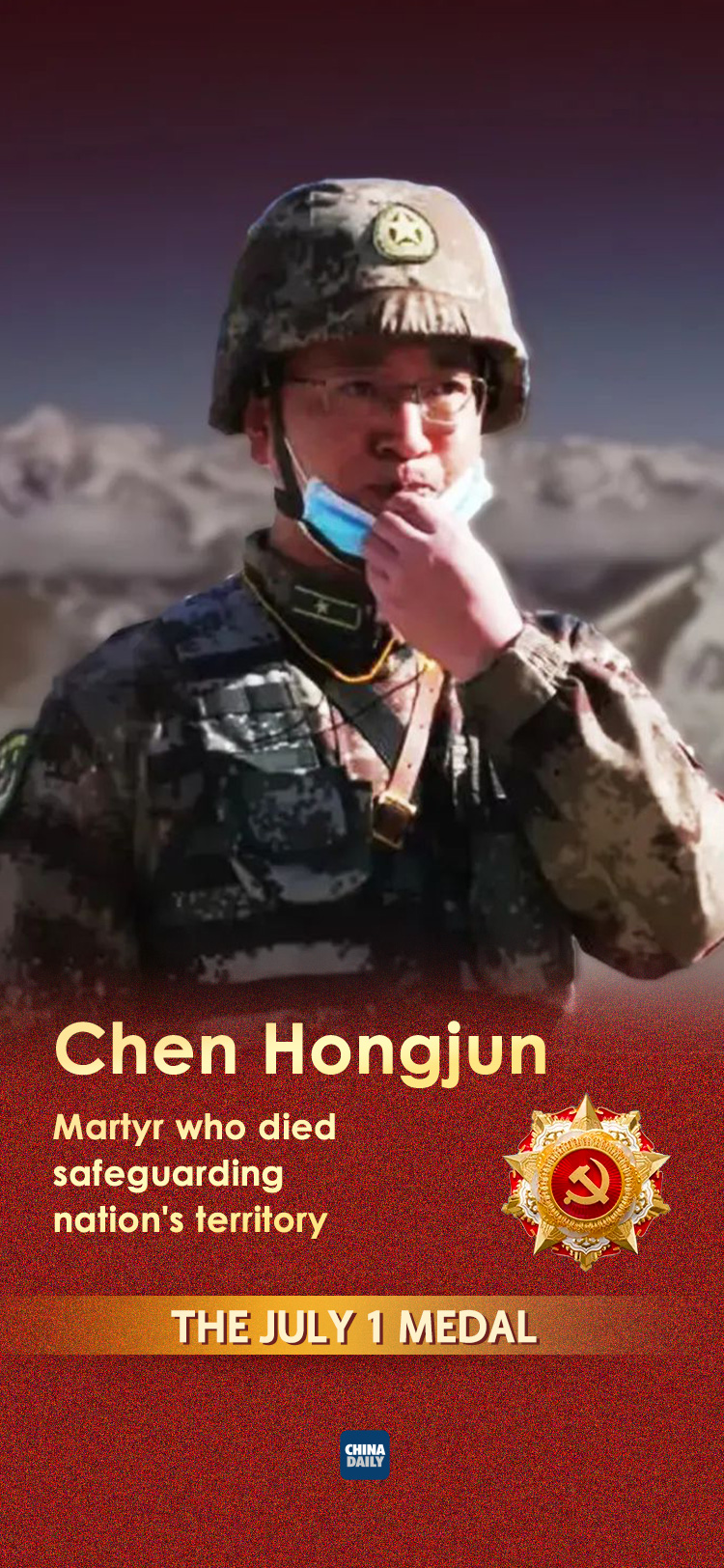Soldier slain during border dispute honored


Commander died trying to rescue fellow troops during clash with Indian military
Xiao Qianwen saw her husband Chen Hongjun for the last time on June 5 last year.
"Will you love our baby if it's a boy?" Xiao, then pregnant, asked Chen during a video call that day.
The answer was a firm "yes", but Chen, an officer who served in the military for more than a decade, would never know if his baby was a boy. A few weeks after that last call, Chen died in a skirmish at the border.
Born in 1987, Chen grew up in a small town in Gansu, a landlocked province in northwestern China. In the rural area where he lived, becoming a soldier or a university graduate is seen as an honorable accomplishment, and he had done both.
In 2005, Chen began studying psychology at Northwest Normal University, a leading school in the province. He passed the police recruitment exam in his final year at school and was ready to be a member of the local SWAT team, but he opted not to join.
Later, Chen saw a military draft notice on campus.
Without any hesitation, he signed up for it because it offered him a chance to fulfill a lifelong dream. "When he was young, Chen often 'stole' his uncle's army cap and put it on his head, and I remember when one of his high school classmates was recruited by the military, Chen borrowed the uniform from him and took a picture with it on. He told me that one day, he would have his own uniform," said Ding Nianbi, Chen's mother.

In 2009, Chen began serving in the People's Liberation Army Ground Force at the border area on the Qinghai-Tibet Plateau. In the following years, Chen was assigned to different positions in the border defense regiment and had consistently performed well. His prowess led to him becoming the youngest commander in the infantry battalions under the regiment last year.
For nearly half a century, the border between China and India on the Karakoram Mountains has been contested, and conflicts between both sides have occurred occasionally.
According to PLA Daily, the military's flagship newspaper, since April last year, "foreign troops" have severely violated the previous agreement between the two militaries by crossing the borderline to build roads and bridges. They have intentionally instigated problems and even attacked Chinese soldiers that were sent for communication, the newspaper said.
In June, tensions escalated as Indian soldiers crossed the Line of Actual Control at Galwan Valley, which the PLA saw as a violation of the bilateral agreement. Following the rules and terms for border dispute management that had been agreed upon by both sides, Qi Fabao, a commander of the border defense regiment, led several soldiers to negotiate with the foreign troops and tried to solve the problem.
The newspaper report said that during the negotiation, Qi discovered that the Indian military, which had ignored Chinese soldiers' efforts for a peaceful resolution, had hidden and deployed a large number of soldiers in the hope that the Chinese troops would be scared off due to sheer numbers.
Despite Qi and his soldiers being outnumbered, they bravely defended themselves in the face of the Indian troops' steel bars, clubs and rocks before Chen and his men rushed to protect Qi.
Qi was rescued, but as Chen led his men to a safer area, he saw several Chinese soldiers were besieged. Once again, Chen and his soldiers charged forward.
The skirmish was short, but it cost Chen his life.
"Before we were ready to rescue those soldiers at the valley, Chen said he would lead us there and promised to take everybody back safely," said Qu Yuanjun, one of the officers who participated in the rescue. "However, he was unable to keep his promise that time."
In February, the Central Military Commission gave Chen the honorary title of "Hero Safeguarding the Motherland and Protecting Borders".
As this year marks the 100th anniversary of the founding of the Communist Party of China, the CPC Central Committee decided to award, for the first time, the July 1 Medal to 29 Party members who have made outstanding contributions to the Party and the people.
Chen was selected as one of the honorees. While his heroic deeds proved his loyalty to the country, they also brought infinite grief to his family.
"He had bought a house close to his sister's home for us. Perhaps he thought she would take care of us in case he left us one day," said Ding, who is still struggling with her son's death.
In a television interview, Xiao said among her husband's belongings that were returned to her, she found his wallet, which contained a photo of their wedding.
As the family headed to the cemetery housing Chen on April 3, police officers in Lanzhou, capital of Gansu, led the way, with motorcycles flashing red and blue lights to pay tribute to the martyr.
As Xiao stood with the family in front of Chen's tombstone, she held their baby boy, who was born four months after his father's death.
- Mount Qomolangma's foreign tourist number doubles in 2024
- Yuyuan Garden lights up with Year of the Snake lantern installations
- New dendrobium orchid species found in Sichuan
- People welcome the New Year across China
- China's railway trips expected to hit 11.5 million on New Year's Day
- Beijing: where ancient traditions meet modern marvels





































